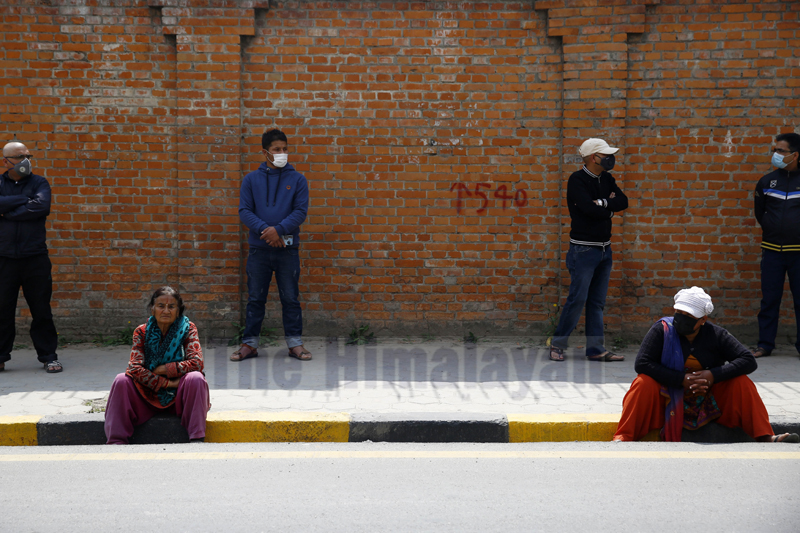Is Nepali immunity environmentally enhanced against COVID-19?
KATHMANDU: As COVID-19 spreads across the world with more than one million confirmed cases and over 58,000 deaths (according to the latest figures from Johns Hopkins University as of April 4), Nepal has seen six positive cases as of today but no deaths till now. When Nepal saw few COVID-19 cases, initially many had speculated if this could be a result of our hardy immune system, the way we have grown up and lived in harsh and not-so-clean environment.
Public Health Scientist Sameer Mani Dixit, Head of Research at the Centre for Molecular Dynamics Nepal asked -- “Do we have an enhanced immunity against pathogens that normally cause severe disease(s)? Or in certain cases, are we able to fight that disease better because of some level of enhanced immunity?”
According to him, children play on the streets, drink unhygienic water… in developing counties like Nepal. “Some will die while others survive and that’s due to their immunity — these children are able to fight bacteria and viruses better in their adulthood,” he explained of the existing 40-year-old hygiene hypothesis after having observed that there are lesser infections and even lesser deaths in developing countries like Nepal since the outbreak of the current pandemic.
“Immunity for any organism develops either through infection or through vaccination. Since this is a new virus, people are susceptible towards this virus and there is no immunity against it,” informs Dr Shravan Kumar Mishra, Joint Chief MT (Senior Virologist), Ministry of Health and Population, adding, “But regarding this virus, does immunity last longer or is it temporary — is a matter of research.”
COVID-19, caused by a new coronavirus called SARS-CoV-2, was first reported in December 2019 in Wuhan, China. This new coronavirus was seen in humans for the first time. Coronavirus genus lies under the family Coronaviridae. The first coronavirus isolations were infectious bronchitis virus in the 1930s, informed Dr Mishra. In 2003, an outbreak of a new disease — Severe Acute Respiratory Syndrome (SARS) — was shown to be caused by a novel coronavirus, SARS-CoV in humans. Since the SARS outbreak, a number of new coronaviruses have been identified, including ones from bats and humans, and additional coronaviruses are likely to be identified in the future.
As children we might have fought viruses and bacteria including those from the coronavirus family though not this new virus, opines Dixit. “We might have developed an immunity to fight it.”
Disease is related to immunity. If you have low immunity, you are vulnerable to any disease which increases its intensity, severity and chance of mortality, which is a natural phenomenon. This includes elderly people. Though young people are not spared by or are immune to COVID-19, the older population and people of any age who have serious underlying medical conditions may be at a higher risk of developing serious complications from COVID-19, as per CDC.
On April 2, Dr Hans Henri P Kluge, WHO Regional Director for Europe in a virtual briefing and press conference on COVID-19 addressed the topic ‘Older people are at highest risk from COVID-19 — the evidence and solutions’. “Older adults are at a significantly increased risk of severe disease following infection from COVID-19. This is a very important observation for the European Region,” he said. “We know that over 95 per cent of these deaths occurred in those older than 60 years. More than 50 per cent of all deaths were people aged 80 years or older. We also know from reports that eight out of 10 deaths are occurring in individuals with at least one underlying co-morbidity, in particular those with cardiovascular diseases/hypertension and diabetes, but also with a range of other chronic underlying conditions.”
When it comes to Nepal, we have not had such cases. “There might be some hidden cases but there is a difference in such cases remaining hidden among younger people and older people. If elderly people get sick, they are taken to hospitals. If there is any death, it is reported too,” Dixit opines. As Nepal has had no such COVID-19 related case with the older population (with the exception of the sixth positive case of 65-year-old woman), he said many questions remain.
One of the questions is — does our older population have an enhanced immunity due to their experiences of childhood?
There is no evidence to support hygiene hypothesis, said Dr Mishra. “The hand washing, sanitising the hand with alcohol-based sanitiser is suitable to break the chain of transmission. This virus is an enveloped virus and gets damaged in alcohol-based or detergent-based liquid or soap and hence is the best step to adopt in such a pandemic situation,” he added. But: “Can one be protected if one gets the Influenza vaccination?” That is because Influenza vaccine is the available vaccine for the respiratory virus. However, we can’t say that the vaccine can protect one from coronavirus, he shared.
In the worst-case scenario, one might be infected with the virus of COVID-19. But if one has good immunity, one has a higher ability to fight any disease. Dr Mishra added, “If people have no other diseases related to lungs, heart, diabetes, their prognosis or chance of getting better is higher.”
Also, the good part is that the neutralising antibody developed against this virus is able to neutralise this virus. “If one is infected with the coronavirus, one’s body makes antibodies IgM and IgG, according to studies carried out on those who have recovered from COVID-19,” he shared.
More research and investigation have to be carried out on the novel coronavirus infection. Secondary infection is possible by this virus, and whether the secondary infection is mild or more aggressive is again the issue of extensive research, Dr Mishra concluded.






